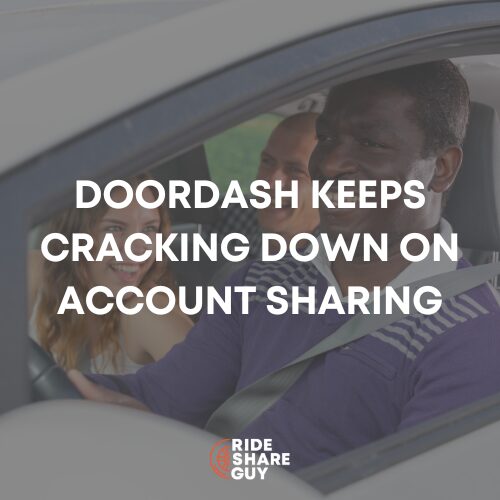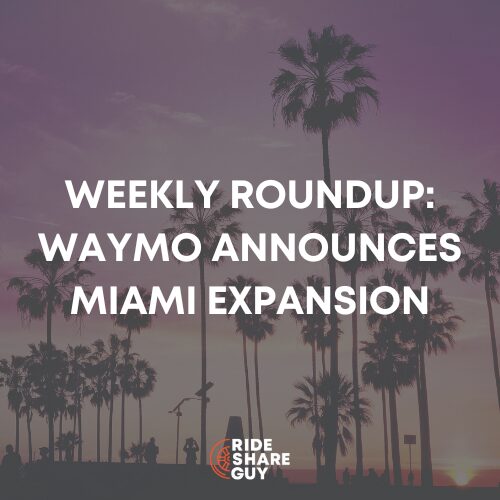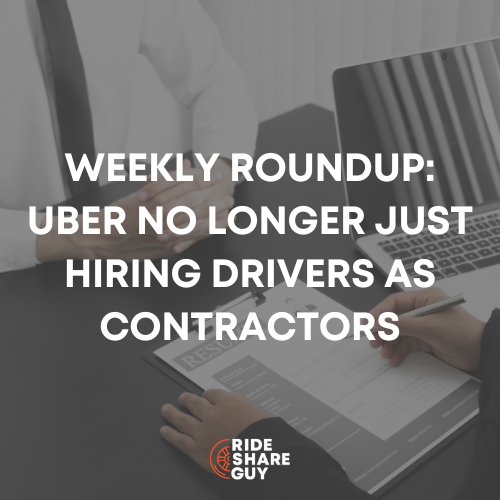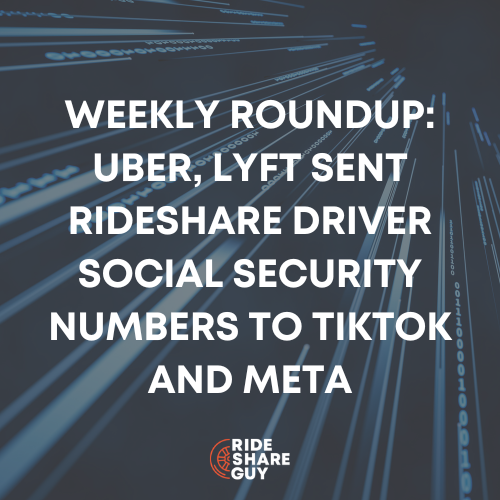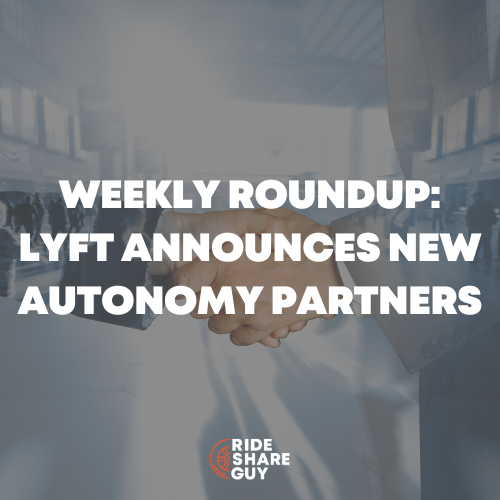The world has been turned upside down once more with Russia invading Ukraine. But, the world still goes on, and along with it is the usual rideshare news. Join senior RSG contributor Paula Gibbins with this week’s roundup, focusing on Uber expanding their platform while also rolling out California’s pay model to the rest of the nation, and more.
Uber Taking California Pay Model National in Pilot Program to Attract New Drivers (Times of San Diego)
Summary: Uber is testing a new driver algorithm in 24 U.S. cities that allows drivers to see pay and destinations before accepting a trip, while also raising incentives.
The company – which has been doing something similar in San Diego and throughout California post-Proposition 22 – hopes to encourage drivers to take on short rides in an effort to attract more of them to the service.
The changes, which are currently in pilot programs, mark the most wide-ranging updates to Uber’s driver pay algorithm in years and come at a time when the company is still trying to win back drivers who left at the start of the pandemic.
Fares paid by consumers are not affected.
Drivers have long demanded the ability to see the fare and destination before accepting a trip. Uber has resisted, saying it could open the door to drivers cherry-picking trips or discriminating against riders in disadvantaged neighborhoods….
My Take: While Uber’s concerns about drivers cherry-picking or discriminating against certain neighborhoods may be legitimate, this is a step in the right direction for drivers. And not just because true independent contractors should have as much upfront information as possible. But also, with the rise of carjackings, it is in the drivers’ best interests to avoid some neighborhoods if they don’t feel safe.
It’s a dangerous world out there, and this added information could prove essential for saving lives, though it’s unfortunate that things have gotten as bad as they have.
Is this change for the better, though? See what RSG contributor Joe Pierce had to say about upfront pricing when it came to Minneapolis.
If you want to know more about the changes that rolled out, check out RSG’s article Uber Upfront Pricing Makes a Move Into New Markets that we published in mid-February.
Starbucks Workers Vote to Form Union at Arizona Cafe (Wall Street Journal)
Summary: Starbucks Corp. SBUX -1.64% baristas voted to unionize at a third company cafe, as the chain has intensified efforts to win over employees who have held pro-union rallies.
The 25-3 vote tally in favor of forming a union at a cafe in Mesa, Ariz., took place Friday afternoon, after the main U.S. labor relations body struck down the coffee company’s request to reconsider whether it was appropriate for individual stores to vote to organize.
The Starbucks Workers United union is set to represent baristas at three Starbucks stores, following a successful organization campaign at two chain locations in the Buffalo, N.Y., area late last year. That vote formed the first union at Starbucks’s U.S. corporate stores.
Starbucks said Friday the company will bargain with unionized workers in good faith, and that the company hopes the union will do the same….
My Take: Now, this one may not be rideshare related in the traditional sense, I’ll admit. But it is interesting and related to the fact that these workers are craving more flexibility, which is something that rideshare drivers tout as a very important aspect of their gig work.
Unions seem to work for many, so I hope these Starbucks workers are able to get what they want.
You can book dinner reservations and buy event tickets on Uber now (Tech Crunch)
Summary: Uber is launching a new feature on Tuesday that will allow customers in 15 cities across the U.S. and Mexico the ability to browse and book experiences like dinner reservations or live events directly through the app.
An Explore tab in the Uber app will populate recommended destinations in categories like food and drink, art and culture, nightlife, music and shows, and more based on a user’s past use of Uber and Uber Eats, according to Uber. The app will invite riders to “ride there now” to easily book a ride. Select restaurants and bars will offer 15% off rides, which equals up to $10 for now — Uber told TechCrunch these discounts would not affect drivers, but did not elaborate.
“We’ve built Uber Explore to take our customers beyond the ride,” Adib Roumani, product lead for Uber Explore, told TechCrunch. “People have always come to the Uber app for the point A to point B piece of the journey — so we’re thrilled to expand and help inspire the destination, too. Through a variety of personalized offers and experiences, customers will be able to see trending locations near them and also browse for activities and events in their area.”…
My Take: More expansion. More features. That’s what all these rideshare and gig work apps are moving toward.
Who can make it first to be the one that does everything? Need food? No problem! Want to go out on a date night? We can book that for you! A concert? Sure, let’s get you those tickets!
DoorDash is Buying Bbot (Food On Demand)
Summary: Consolidation continues sweeping through the restaurant tech space, with DoorDash announcing a deal to acquire hospitality startup, Bbot. The delivery giant says Bbot’s ordering, payment and marketing software will give its merchants more solutions for in-store and online channels and “better support the evolving needs” of restaurant and venue operators.
“Over the past few years, the hospitality industry has seen the benefits of growing their online channels as well as digitizing their in-store operations,” said Bbot CEO Steve Simoni. “Joining forces with DoorDash enables us to more rapidly scale our solutions so that, together, we can equip more businesses with more low-cost tools to help them provide excellent customer experiences and compete in today’s digital world.”
Bbot’s in-store digital ordering software allows merchants to increase sales while creating higher quality experiences for customers and staff. Just as customers benefit from shorter wait times to order and pay, staff benefit from faster table turnaround times and greater focus on service. Merchants also have the ability to utilize all their tables and extend their hours even when faced with staff shortages.
Bbot’s solutions include a QR code scanner that brings customers to a merchant-branded, interactive online menu for in-store ordering. Guests can order with one another and alongside servers on a single, open tab. Bbot’s flexible technology works with a merchant’s existing software services, including POS systems, loyalty programs, and reservation services, and operates on a variety of merchant and consumer devices, including handhelds and tablets….
My Take: DoorDash is likely looking to improve customer experiences even though they are the hottest fast food platform out there. But it’s good to want to improve, right?
I just hope they look into improving things for the drivers as well. Two minutes on the DoorDash driver subreddit, and you can see that drivers are not exactly happy with the way things are going. There’s not enough upfront information given, and pay is always an issue that needs addressing.
Lyft offers Ukraine staff financial support for moves, supplies (Reuters)
Summary: Ride-hailing app provider Lyft Inc (LYFT.O) said on Thursday it is offering its employees in Ukraine financial support for emergency supplies or to temporarily move, along with increased time off, amid a Russian invasion of the country.
Lyft said in December it was on track to have 60 employees in Ukraine, including engineers and scientists, by the end of last year.
My Take: I don’t think most of us can comprehend what’s happening and how people are feeling and reacting and surviving in Ukraine right now. I just hope that companies and people keep trying to help the people out. The world is in turmoil and it’s likely going to get much worse before it ever has a chance to get better.
How did this weeks’ news impact you? What do you think about the mass union organizing movements happening nationwide in different sectors?
-Paula @ RSG
